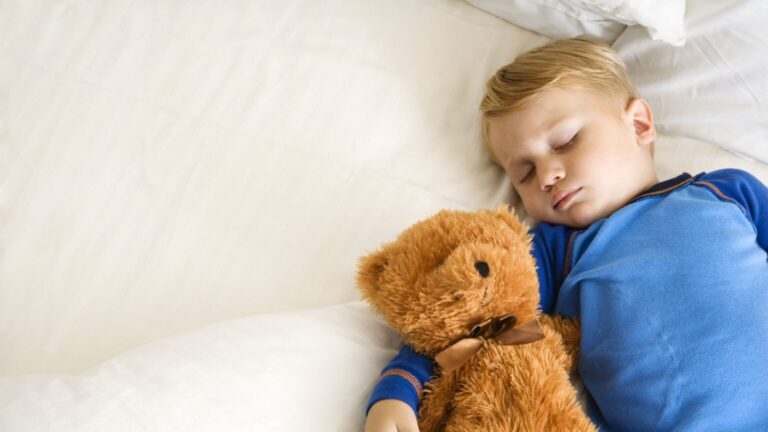Healthy sleep hygiene may benefit all children, but the relationship between sleep and autism goes a bit beyond those standard benefits. Many autism experts state that sleep is a vital key to unlocking a child on the spectrum’s full potential. When children with autism spectrum disorder (ASD) get restful and meaningful sleep, they can focus and learn more effectively, leading to better outcomes for autism-based therapies.
Restorative sleep impacts nearly all aspects of a neurodivergent child’s life positively. At ABA Centers of Florida, we commonly promote the importance of good sleep habits just as we’d promote a healthy diet or regular exercise. We want every child with ASD to thrive and be the best version of themselves, so catching those z’s is a must. Let’s explore the correlation between sleep and autism while discussing some tips for rest.
Do Children with Autism Have Trouble Sleeping?
Many children with autism experience problems falling and staying asleep each night. ASD is a neurodevelopmental disorder that affects communication, sensory processing, and behaviors, all of which can contribute to poor sleep hygiene or sleep disorders. Anxiety, gastrointestinal disorders, and medication side effects may also contribute to the inability to sleep restfully. When falling asleep, children with ASD may experience fears of dreaming and issues with the sleep-wake cycle. Regarding staying asleep throughout the night, nightmares or sleepwalking can lead to irregular sleep patterns or constant waking.
Sleep Deprivation in Children with Autism
Any hindrance to a proper sleep routine can cause sleep deprivation in children with ASD. If not addressed immediately, this deprivation can worsen autism symptoms and lead to long-lasting sleep difficulties that may be hard to overcome. Some primary signs of sleep deprivation in children with autism include:
- Hyperactivity
- Irritability
- Difficulty concentrating or focusing
- Increase in repetitive behaviors
- Social withdrawal
- Severe lack of energy
- Persistent yawning or eye-rubbing
Children experiencing sleep deprivation may also fall asleep at inappropriate times throughout the day, during therapy sessions, playdates, school, dinner, or other moments when they should be attentive and focused. If this happens to your child, you shouldn’t hesitate to contact their doctor or behavioral therapist to discuss ways they can improve their rest. While it may seem a burdensome task, addressing the issue before it worsens is paramount for the betterment of their sleep habits in the future.
What Are Some Consequences of a Lack of Sleep and Autism?
Poor sleep hygiene can trigger various challenging behaviors in children on the spectrum, especially when extremely tired or sleep-deprived. These behaviors include aggression, tantrums, and self-injury, such as headbanging, face-slapping, or hand-biting.
A severe lack of sleep not only makes it difficult for a child to function as they should, but it also causes distress to everyone involved. Children with ASD who are sleep-deprived or severely fatigued may have trouble listening, following directions, or completing simple tasks, which can add stress to loved ones such as parents, caregivers, and siblings. When these individuals don’t know the cause of such behaviors, they may become frustrated and wrongly accuse the child of acting out. However, children in these positions don’t wish to act negatively toward their loved ones – their bodies cannot process and function as they should, causing these issues no matter how much they try to avoid them.
What Are the Benefits of Proper Sleep and Autism?
Research shows that receiving adequate sleep during the developmental stages of life is essential for proper brain development. Autism experts also believe sufficient sleep is integral to cognitive and psychosocial development. On the contrary, a lack of sleep in these formative years can lead to mental ailments such as anxiety, depression, and cognitive impairment, among other adverse mental health conditions.
For children with autism, good sleep habits can help improve behavior, social skills, academic performance, memory, and cognition. Studies also show that these children experience enhanced communication skills and have more meaningful interactions or engagements overall. This positive change to their communication skills can reduce anxiety and stress when placed in unfamiliar environments or social settings.
What about parents of children with an improper sleep schedule? Well, they also feel the brunt. The correlation between improper sleep and autism can be troubling for a parent, who must alter their routine to accommodate their child. Whether waking up in the middle of the night to ease them through nightmares, spending hours putting them to bed, or reading bedtime stories five times over when work beckons the next day, a parent can easily experience the same sleep deprivation as their loved one. Awareness of your sleep wellness is essential because a tired parent will have more difficulty tending to their child than a well-rested parent.
Tips for Healthy Sleeping Habits in Autism
Here are four tips you can incorporate into your and your child’s life to better their sleeping habits and produce favorable outcomes:
1. Establish a Bedtime Routine – Following a regular sleep regimen each night can improve your child’s ability to fall and stay asleep. When they grow accustomed to a routine, they experience less stress and anxiety as they know what to expect, and their bodies can adjust to falling asleep at a consistent time. This routine also helps with sleep cycles such as REM and circadian rhythm.
Establishing a sleep routine doesn’t only begin with getting into bed. Sleep routines for your child can also include pre-sleep hygiene like washing their face, brushing teeth, and getting into pajamas. No matter what you do to prepare your child for bed, remain consistent with the time you start, when their eyes should be closed, and when you expect to head to sleep.
2. Keep Your Child Away From Caffeine After Lunch – This concept may seem like a no-brainer for any child; however, caffeine is significantly jeopardizing for children with ASD due to the frequency of sleep-related complications. During dinner, do your best to keep sodas and sugary drinks to a minimum, if at all, and ensure your child avoids sweets before bed.
3. Limit Screen Time Before Bed – Research shows that screen time, such as TV, video games, tablets, and other electronics, can severely hinder a child’s ability to receive adequate sleep. Blue light before bed not only draws and holds a child’s attention when their brain should be winding down, but it also worsens their ability to fall asleep.
Try to limit time on these devices to a minimum before bed to allow your child to grow tired naturally. Replace these electronics with books, arts & crafts, or other engaging activities where their eyes don\’t fixate on a single screen for extended periods.
4. Create a Calming Bedroom Atmosphere – If possible, keep your child’s room dark, quiet, and free from loud noises. Maintaining a consistent temperature can also help a child grow accustomed to routine. Nightlights can create an ambiance, while white noise or nature sounds can prove relaxing. The primary goal is to avoid stimuli inhibiting your child’s ability to drift off and maintain a good night’s rest.
ABA Therapy Can Help Sleep and Autism
ABA Centers of Florida understands how valuable sleep is for autism families and how much stress it can cause if not appropriately addressed. Our ABA therapy programs work to reinforce good habits for rest, such as limiting screen time, communicating needs, and winding down when stressed.
Beyond sleep, ABA therapy helps children establish healthy routines to reduce anxiety. We give children the confidence they need to prepare for the unexpected and find practical solutions to issues at hand. Our in-home ABA services can also enhance a child’s ability to adhere to routines established in their home life, such as eating, hygiene, and bed preparation each night.
Call (772) 773-1975 or visit our website to learn more about ABA therapy for healthy sleep habits or a free consultation.








